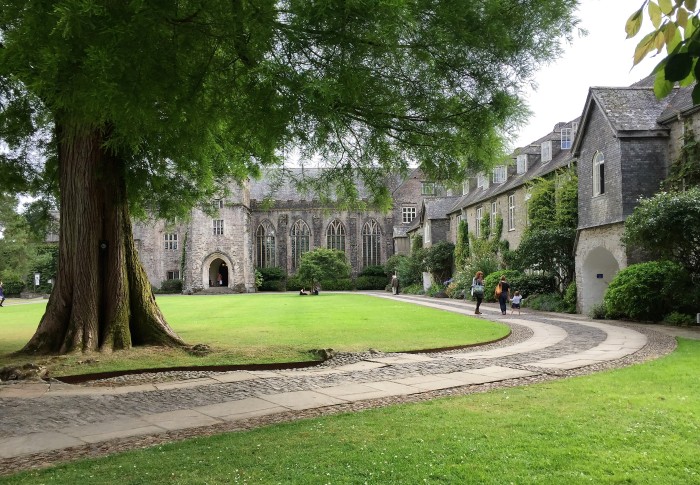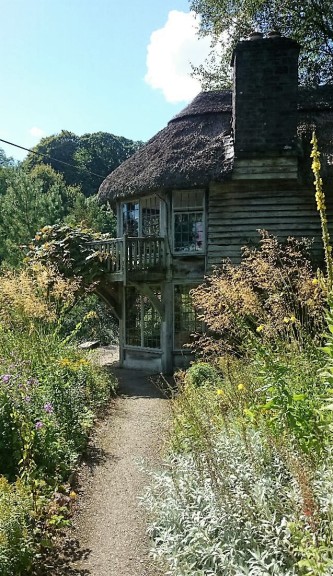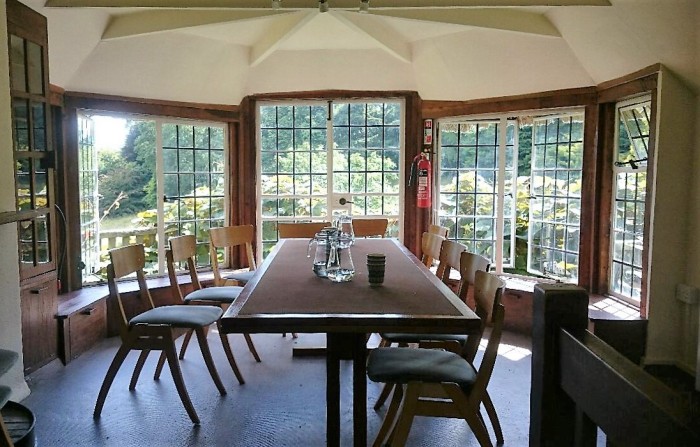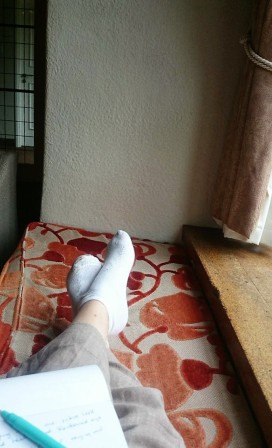
In the warmish summer of 2016 there was a wise and beautiful lady who ran a writing course in the grounds of the medieval hall at Dartington, among the trees and flowers where music plays and voices sing from dawn until the moon rises shimmering over the river. I stumbled onto Marina Warner‘s course by accident, having been too dreamy to read my brochure attentively, and expecting only music in this enchanted place. But her welcome was as gracious to the wandering stranger as to the more studious participants, and this is what happened over the next five magical days.
Replete with a breakfast of local fruits and meats, we passed through fertile gardens and followed a green slope shaded by a spreading mulberry tree. Steep stone steps led to a small wooden hut whose interior swelled Narnia-like to encompass a bay window and another storey below. Here we descended to write our stories on days when the rain lashed the leaded panes and the clouds grumbled through the grey skies. But such times were few: in sunnier hours we found secluded dells and tranquil shade wherein to nurse our newborn words.
Steep stone steps led to a small wooden hut whose interior swelled Narnia-like to encompass a bay window and another storey below. Here we descended to write our stories on days when the rain lashed the leaded panes and the clouds grumbled through the grey skies. But such times were few: in sunnier hours we found secluded dells and tranquil shade wherein to nurse our newborn words.
“Cross-currents in the Ocean of Stories” was the theme: Marina led our journey through stories past and new, across oceans and deserts, from Mount Olympus through Arabian nights, crusades and silk roads and Celtic woodland, widdershins through conflict and desire and the eternal plight of the refugee. In safety we met monsters and explored the byways of fairy tales. We were a varied group of ages and styles, with backgrounds in writing and teaching and radio and television, psychotherapy and the visual arts. One of us could say with proud truth:”I was born in a place called Drama”. And because Dartington is a meeting place for young and old, raw and persevering and gifted and internationally famous musicians, we were also viol players and lutenists and singers, and when we were not listening, reading and writing, we were making music together.
Marina spoke of realism and fantasy, how Ted Hughes and Philip Pullman make the fairy-like corporeal and psychological, of the highly valued slave musicians of the caliphs and of the souls of trees. In our hut in the garden, we considered plants: no respecters of borders, cross fertilising, blow-ins without language. We agreed that fairy tales can be told and retold ad infinitum, in an oral tradition that seems everlasting but is yet vulnerable, a tradition that is bottom up, but used and reused by the gods of literature, by Chaucer and Shakespeare and Boccaccio and Dante, Kafka in his “fairy tales for dialecticians” and in our own times by Angela Carter and AS Byatt.
We considered riddles, quests and prohibitions, objects that come to life and speak, (magic carpets; violins strung with the hair of murder victims), astrology and imprisonment, the princess who says no and the princess who yearns, the ghost and the creature transformed. We found love, hate, desire, and shame and redemption in these stories; curses and physical deficiencies; possibilities that break all known rules and yet reside within a universally recognisable framework.
And what of language? There were proverbs, rhymes, repetition, alliteration, rhetoric…strange languages and onomatopoeia. We learned from admonitions and fables and received advice. We told the time: predictive, recollection, time stopped as in the Sleeping Beauty, time postponed as in the Arabian Nights. Who is the narrator and what does she know? Is the child reliable; does the old crone tell the truth; can the messenger be believed?
We talked of modern fairy tales, making sense of horror. Marina told of a Nobel Prize winner writing of Chernobyl and of the Last Wolf of Extremadura. Does cruelty in fairy tales incite, or comfort? She is working at present on storytelling projects with refugees; some psychologists do not want to add to their trauma by using fairy tales; others see it as cathartic. But refugees are not a blank slate: they disseminate and collect their own tales on their journeys, as did the men (and women?) who accompanied Marco Polo and Richard the Lionheart. (See more details of the Palermo based project here.)

Marina set us tasks. We’d to find an object in the garden and set a riddle; we’d to use repetition as in a traditional tale (I’ll huff and I’ll puff and I’ll BLOW your house down). We’d to write of an item precious to ourselves: jewellery proved popular here, but one man chose the participant badge without which he would not be fed, instructed or entertained at Dartington and I chose my glasses which enable me to see. We were asked to write a piece of persuasive dialogue.Some of us faltered, some of us omitted it, nobody failed, most of us bloomed. This was not a modern course, with aims and objectives and evaluations at the end, or if it was they were well disguised: it appeared that we meandered from curious to fascinating, from touching to heart-rending, from personal to universal, but in the terrible world of today it all made perfect sense. Marina quoted André Jolles: “The miraculous is here the only possible guarantee that the immorality of reality has stopped.”
It’s too early to say that we all wrote happily ever after, but we were set on our way. Updating this in July 2019, I’d like to thank Marina again here, a few weeks before my second novel The Magic Carpet is published. I’m not sure it would have taken the form it has, or any form at all, if it were not for that initial inspiration from her course. I cannot recommend highly enough a reading of Marina Warner’s work. If you can combine it with a visit to Dartington, you will be in a fairy land of your own. May your good wishes be granted and bless you for reading.

©Jessica Norrie 2016
What a wonderful, magical place for a writers’ retreat. The photo at the top reminds me of my old school, where I spent a lot of time making up stories! 😉 Thank you for following me and the storyhounds – we’re happy to follow you back.
LikeLiked by 1 person
I’ve read some of Marina Warner’s books on fairy tales and their meanings – fascinating. Your time at Dartington sounds amazing.
LikeLiked by 1 person
This sounds like the perfect place to encourage the imagination and make creativity bear magical fruit. It’s truly a delightful post. Thank you, Jessica. 🙂 — Suzanne
LikeLike
Thank you – we can always dream can’t we!
LikeLike
A perfect environment to spark creativity. I would love it there! I once attended a writer´s workshop at Lake Louise in Alberta, Canada. It had a similar effect.
LikeLiked by 1 person
Yes, a well run workshop can make all the difference. Better than sitting at home before a blank page…
LikeLiked by 1 person
Excellent article. 🙂
LikeLike
Thank you!
LikeLiked by 1 person
🙂
LikeLiked by 1 person
Reblogged this on Smorgasbord – Variety is the spice of life and commented:
Jessica Norrie explores a garden of faerie delights as she attends a writing course with a magical influence at Dartington.. Sounds like a terrific way to explore the writing of fairy tales..
LikeLiked by 1 person
I’m glad you liked it – having seen your own fairy tale telling I thought it might strike a chord!
LikeLiked by 1 person
Absolutely Jessica..lovely..
LikeLiked by 1 person
That sounds like an amazing retreat.
LikeLiked by 2 people